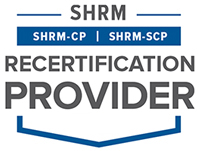+1-800-385-1627
support@hrtrainonline.com
0 items
HR Auditing - Important Issues For 2024
90 Minutes
6 months
34303

Group Attendees: Any number of participants
Recorded Version: Unlimited viewing for 6 months ( Access information will be emailed 24 hours after the completion of live webinar)

The use of this seal confirms that this activity has met HR Certification Institutes (HRCI) criteria for recertification credit pre-approval.
This activity has been approved for
1.5 HR
(General) recertification credit
 HRTrainOnline is recognized by SHRM to offer Professional Development Credits (PDCs) for the SHRM-CP® or SHRM-SCP®.
?
HRTrainOnline is recognized by SHRM to offer Professional Development Credits (PDCs) for the SHRM-CP® or SHRM-SCP®.
?
1-hour and 15 minute concurrent conference session = 1.25 PDCs.
3-hour e-learning course = 3 PDCs.
HR audits are designed to help your organization focus its attention on its human resource management practices, policies, procedures, processes, and outcomes by providing you with a structured and systematic series of questions about key compliance, risk management, internal auditing, and human resource management issues.
As an auditing process, HR audits are designed to help your organization identify potential and actual problem areas, help assess the effectiveness of HR management activities, help assess weaknesses in HR internal control processes, and help assess human capital strategic and compliance-related risks. HR audits then typically provide suggestions for corrective action.Importantly, HR audits consider human capital-related risks and opportunities from an enterprise risk management (ERM) perspective. That is, HR audits take a holistic approach to assessing human capital risks and attempt to indicate the interrelationships and interactions between HR and other management and organizational issues.
Recognizing that no two employers are alike and that the practices, policies, and processes that may be appropriate and effective for multinational corporations may not be appropriate for small and medium size companies or non-profits, an organization’s HR auditing should help it develop and tailor employment practices, policies, procedures, and processes to meet its specific needs. Thus, your HR audit should first provide your organization with the "right" questions to ask about various employment practices issues; then help you determine the optimal answer for your organization.
While HR audits alone will not guarantee that your workplace will be selected as a "best place to work" or be free from all legal challenges, they will serve as a guide through the maze of human resource management best practices and employment and labor laws and regulations. HR audits will further enhance the value of your organization’s human capital, enhance your organization’s competitiveness, and reduce your organization’s exposure to employment practices liabilities.
Why should you Attend: In the global economy, human capital has become for many organizations the single most important determinant of competitiveness, productivity, sustainability, and profitability. Increasingly, the organization’s human capital is the source of innovation and a driver of business success.
Second, a confluence of economic, political, and social factors, including corporate scandals, the failure of the industries to adequately assess risks, and increasing stockholder initiatives, have resulted in increased statutory and regulatory requirements, a call for greater transparency, and increased internal and external audit activity.
Third, governmental agencies have become more active - some would argue more aggressive - and have committed more resources to conduct assessments of employment policies and practices. Importantly, the EEOC, the OFCCP, U.S. DOL, the NLRB, and ICE have advised employers that they consider self-assessments and audits a "best practice."
How effectively is your organization managing its human capital? Is your human capital helping you achieve organizational objectives? Are your employment practices creating material risks and liabilities? This webinar discusses the development and use of HR Audits in answering these questions and in addressing critical risk management and due diligence issues.
Areas Covered in the Session:
- How effective is your organization’s human resource management?
- Is your human capital helping you achieve organizational objectives?
- Are your employment practices creating material risks and liabilities?
- What are the key organizational issues that should be audited?
- What HR audit tools should be used in conducting the audit
Who Will Benefit:
- SHRM
- IIA
- AICPA
- Risk Managers
- CFOs
- Legal Counsels
 Ronald Adler is the president-CEO of Laurdan Associates, Inc., a veteran owned, human resource management consulting firm specializing in HR audits, employment practices liability risk management, HR metrics and benchmarking, strategic HR-business issues and unemployment insurance.He has more than 37 years of HR consulting experience working with U.S. and international firms, small businesses and non-profits, insurance companies and brokers, and employer organizations.
Ronald Adler is the president-CEO of Laurdan Associates, Inc., a veteran owned, human resource management consulting firm specializing in HR audits, employment practices liability risk management, HR metrics and benchmarking, strategic HR-business issues and unemployment insurance.He has more than 37 years of HR consulting experience working with U.S. and international firms, small businesses and non-profits, insurance companies and brokers, and employer organizations.
Mr. Adler is a co-developer of the Employment-Labor Law Audit (the nation’s leading HR auditing and employment practices liability risk assessment tool.
Mr. Adler is an adjunct professor at Villanova University’s Graduate Program in Human Resources Development and teaches a course on HR auditing. Mr. Adler is a certified instructor on employment practices for the CPCU Society and has conducted continuing education courses for the AICPA, the Institute of Internal Auditors, the Institute of Management Consultants, and the Society for Human Resource Management.
